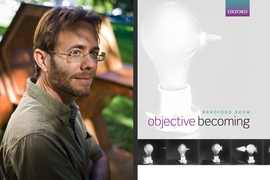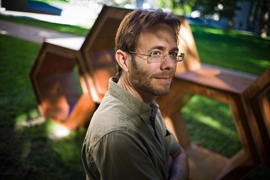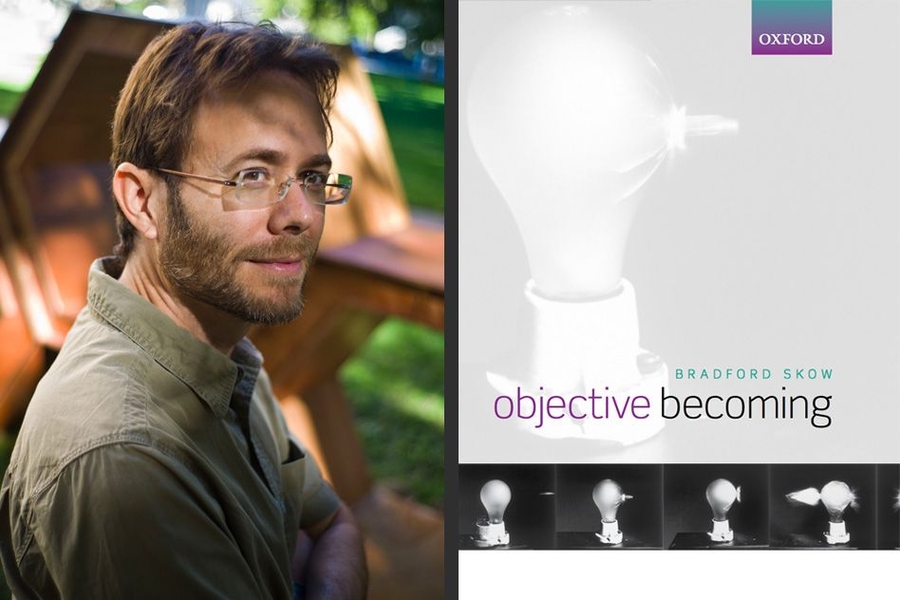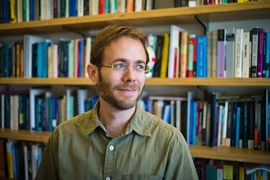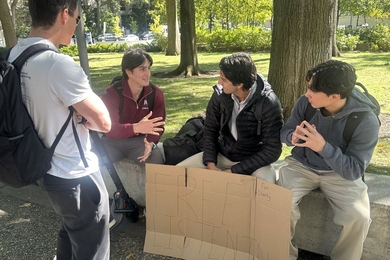“If you walk into a cocktail party and say, ‘I don’t believe that time passes,’ everyone’s going to think you’re completely insane,” says Brad Skow, an associate professor of philosophy at MIT.
He would know: Skow himself doesn’t believe time passes, at least not in the way we often describe it, through metaphorical descriptions in which we say, as he notes, “that time flows like a river, or we move through time the way a ship sails on the sea.”
Skow doesn’t believe time is ever in motion like this. In the first place, he says, time should be regarded as a dimension of spacetime, as relativity theory holds — so it does not pass by us in some way, because spacetime doesn’t. Instead, time is part of the uniform larger fabric of the universe, not something moving around inside it.
Now in a new book, “Objective Becoming,” published by Oxford University Press, Skow details this view, which philosophers call the “block universe” theory of time.
In one sense, the block universe theory seems unthreatening to our intuitions: When Skow says time does not pass, he does not believe that nothing ever happens. Events occur, people age, and so on. “Things change,” he agrees.
However, Skow believes that events do not sail past us and vanish forever; they just exist in different parts of spacetime. (Some physics students who learn to draw diagrams of spacetime may find this view of time intuitive.) Still, Skow’s view of time does lead to him to offer some slightly more unusual-sounding conclusions.
For instance: We exist in a “temporally scattered” condition, as he writes in the new book.
“The block universe theory says you’re spread out in time, something like the way you’re spread out in space,” Skow says. “We’re not located at a single time.”
Spotlighting the alternatives
In “Objective Becoming,” Skow aims to convince readers that things could hardly be otherwise. To do so, he spends much of the book considering competing ideas about time — the ones that assume time does pass, or move by us in some way. “I was interested in seeing what kind of view of the universe you would have if you took these metaphors about the passage of time very, very seriously,” Skow says.
In the end, Skow finds these alternatives lacking, including one fairly popular view known as “presentism,” which holds that only events and objects in the present can be said to exist — and that Skow thinks defies the physics of spacetime.
Skow is more impressed by an alternative idea called the “moving spotlight” theory, which may allow that the past and future exist on a par with the present. However, the theory holds, only one moment at a time is absolutely present, and that moment keeps changing, as if a spotlight were moving over it. This is also consistent with relativity, Skow thinks — but it still treats the present as being too distinct, as if the present were cut from different cloth than the rest of the universal fabric.
“I think the theory is fantastic,” Skow writes of the moving spotlight idea. “That is, I think it is a fantasy. But I also have a tremendous amount of sympathy for it.” After all, the moving spotlight idea does address our sense that there must be something special about the present.
“The best argument for the moving spotlight theory focuses on the seemingly incredible nature of what the block universe theory is saying about our experience in time,” Skow adds.
Still, he says, that argument ultimately “rests on a big confusion about what the block universe theory is saying. Even the block universe theory agrees that … the only experiences I’m having are the ones I’m having now in this room.” The experiences you had a year ago or 10 years ago are still just as real, Skow asserts; they’re just “inaccessible” because you are now in a different part of spacetime.
That may take a chunk of, well, time to digest. But by treating the past, present, and future as materially identical, the theory is consistent with the laws of physics as we understand them. And at MIT, that doesn’t sound insane at all.

